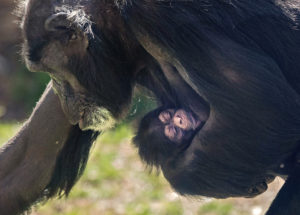 The North Carolina Zoo (now the largest zoo in the world) today announced a new addition to the chimpanzee troop. On Monday, March 18, 2019, a healthy baby was born to chimp Gerre. Both mother and baby are doing well, and the baby started nursing quickly. The gender of the baby has not been determined yet.
The North Carolina Zoo (now the largest zoo in the world) today announced a new addition to the chimpanzee troop. On Monday, March 18, 2019, a healthy baby was born to chimp Gerre. Both mother and baby are doing well, and the baby started nursing quickly. The gender of the baby has not been determined yet.
It is an important birth as there have only been two other successful chimp births at Association of Zoos and Aquariums (AZA)-accredited zoos in the past two years.
The North Carolina Zoo is one of the most successful zoos for breeding chimps. Before Monday’s birth, three infants have been born at the Zoo since 2010: females Nori and Ebi and male Gus.
Gerre (Zha’-ree) who is around 20 years old, is an experienced mother and very protective of her young. She is the mother of Genie, who was born on August 25, 2011, at the Dallas Zoo. Both Gerre and Genie came to the North Carolina Zoo from the Dallas Zoo on November 14, 2012. The gestation period for chimpanzees is 230 days. Chimps have an average life span of 35-40 years under human care.
The Chimpanzee Species Survival Plan (SSP), managed by the AZA, recommended this planned birth. The Zoo’s Curator of Mammals, Jennifer Ireland, is the Vice Program Leader of the Chimpanzee SSP. The Zoo’s chimpanzee troop is one of the larger troops in AZA-accredited zoos in the United States.
According to Curator Ireland, the troop is very curious about the young baby. The last birth at the Zoo, a male named Gus, was on May 14, 2014. The adult male chimpanzees in this troop are known for being gentle and playful with younger chimps.
“Congratulations to the North Carolina Zoo for the new baby chimp,” said Susi H. Hamilton, secretary of the N.C. Dept. of Natural and Cultural Resources. “Today is a cause for celebration at the North Carolina Zoo as well as a critical moment in the conservation world.”
“Every birth is special to us,” said Zoo Director Pat Simmons. “We are thrilled to have this new addition! We hope our guests see the baby as a symbol of how important it is to save chimpanzees in the wild.”
The North Carolina Zoo has been actively involved in wild chimpanzee conservation for more than 15 years in Uganda’s Kibale National Park, which boasts the largest chimpanzee population in East Africa. The Zoo’s program, UNITE for the Environment works in partnership with area schools to improve teaching methods, enable teachers to incorporate more environmental topics into the classroom, and help the local community find ways to reduce their impact on Kibale National Park.
Chimps are endangered in the wild because of habitat destruction of the forests of central Africa and populations have steadily declined over the years. Although numbers are difficult to estimate, the International Union for Conservation of Nature (IUCN) believes there are 172,000 – 299,000 left in the wild.
Chimps are one of the five types of great apes along with gorillas, orangutans, bonobos and humans. They are well-known for their intelligence, tool-use, complex social structures and communication through vocalizations, gestures and body posture and facial expressions that convey emotions such as happiness, anger, depression and fear.
With the new baby, the Zoo’s troop now consists of 16 chimpanzees – 10 females –Gerre & baby (sex T.B.D.), Amy, Ebi, Gari, Genie, Gigi, Maggie, Nori, Ruby and Tammy, and five males – Gus, Kendall, Jonathan, Lance and Sokoto. The Zoo recently lost one of its oldest female chimps, Ruthie, 47, in December of 2018.
